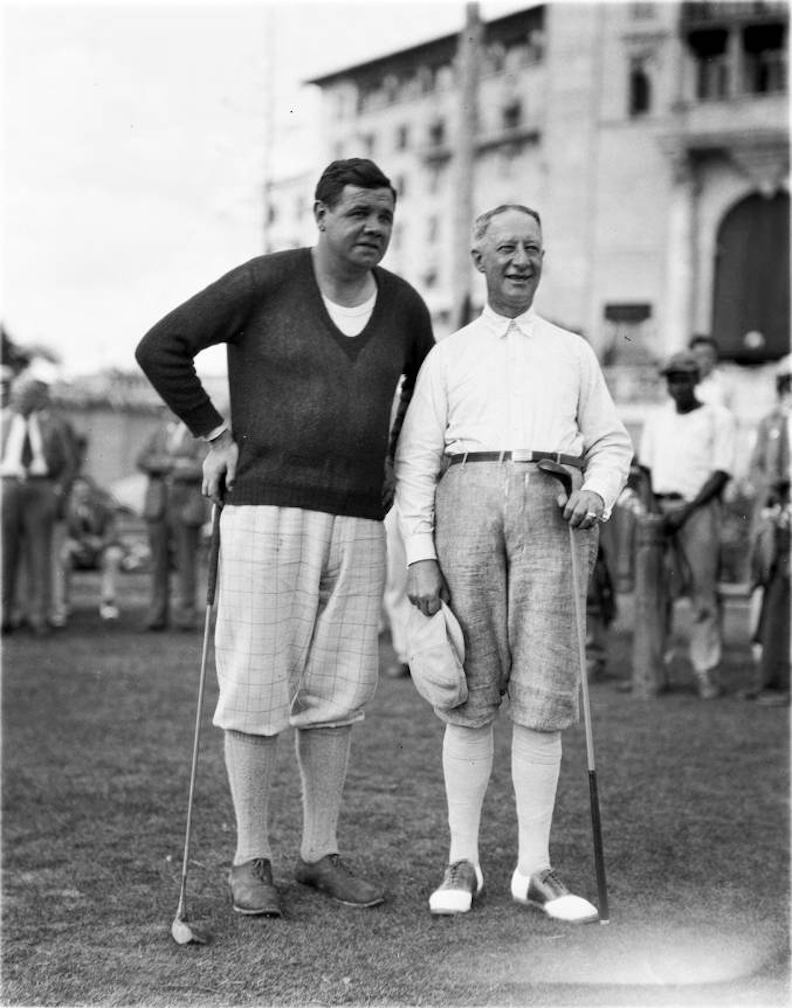Intellectual types ought to care more about sport.
Some do of course (Michael Novak’s The Joy of Sports is one of my favorite books), but even if we’re fans, we tend not to take into account the impact sports have upon the American psyche. Just one possible for instance: Barack Obama will be lining up plenty of Hollywood endorsements, which will doubtless further enhance his allure to star-struck voters, but if John McCain were to get the public support of Tiger Woods — whose father, remember, was a Green Beret — he might just win the election.
Then again, celebrity endorsements are a bit like vice-presidential picks: closely watched by pundits; of limited appeal to voters. World Series MVP and Boston hero Curt Schilling has come out for McCain, but even if the whole Red Sox team lines up behind the Arizona senator, he won’t win Massachusetts. After all, not even Babe Ruth could boost Al Smith over the top in 1928.
Gov. Smith and Mr. Ruth had known each other for a few years, and they would become better friends later on. Both were Catholics and members of the Knights of Columbus, and there was hope that the Bambino might defuse somewhat the anti-Catholic prejudice that was so clearly an element in the race. Perhaps he did, although Gov. Smith was able to win just six southern states and Massachusetts, which is to say: not even his home state. (No doubt George Marlin can explain why Smith won in — of all places — the states with the largest numbers of Ku Klux Klansmen.)
It probably didn’t help much that when the Yankees returned in triumph from St. Louis to Grand Central Station, having swept the Cardinals in the World Series, the Babe dragged two Catholic teammates, infielders Lou Gehrig and Tony Lazzeri, directly across the street to the Biltmore Hotel to see Gov. Smith. Pitcher Waite Hoyt, who wasn’t a Catholic (but whom Ruth often dragged to early Masses in the American League cities they visited), was also in tow and liked to tell how the Governor was in the midst of a radio broadcast when the players burst in loudly — having consumed a lot of booze on the trip home — and how Ruth took the microphone, said kind words about candidate Smith, and introduced Gehrig who did the same. Then the Babe took back the mike and said:
“Here’s Tony Lazzeri, great second baseman, world champion . . . Tell us, Tony, who are the wops going to vote for?”
So much for endorsements.

But the role sports play in shaping our view of the world is profound, and I don’t think we’re making the connection to other aspects of American life. I’m not just arguing here about our National Pastime, but the words of Jacques Barzun come to mind: “Whoever wants to know the heart and mind of America had better learn baseball, the rules and the realities of the game. . . .” Baseball is all about the rule of law, tradition, competition, community, and individual excellence. Is there any force more free-market than free agency? Can you imagine an umpire stopping play to allow a hitter to take first because his team needs some court-mandated, compensatory assistance?
We have phys-ed departments at most universities, but very little scholarly work is done about the effect of sports upon the American consciousness. We see sporting terminology enter public conversation about other aspects of culture — “level playing field,” “fair play,” “three strikes,” “out-of-bounds,” “homerun;” it’s an all but endless list — but we rarely consider the extent of the influence of sports on the way Americans see the world. With the exception of the designated-hitter rule, it’s one of the few things in American life that the liberals haven’t managed to degrade. Sports remain utterly fair, yet completely meritocratic.
And in a year when we are hearing a lot about “post-racial America,” what’s the one, most visible institution in our history that has done the most to eradicate the old intolerance? You know the answer, and it isn’t Congress or the Supreme Court. Ballparks aren’t cathedrals, and The Official Rules of Major League Baseball isn’t the Constitution, but in a hierarchy of goods the game isn’t far behind faith and law.
I admit to feeling uneasy whenever football teams are led in prayer for victory over the guys in the other locker room who are also praying for victory. Still, there’s something significant being taught to youngsters especially in America’s love of sports: something about courage, something about true equality, and something about simple justice. And yet we treat sports as mere diversions.
But sports are as essential as politics. If anything, the formative impact of sports is even more important, and the effects are fundamentally conservative.
Play ball!














